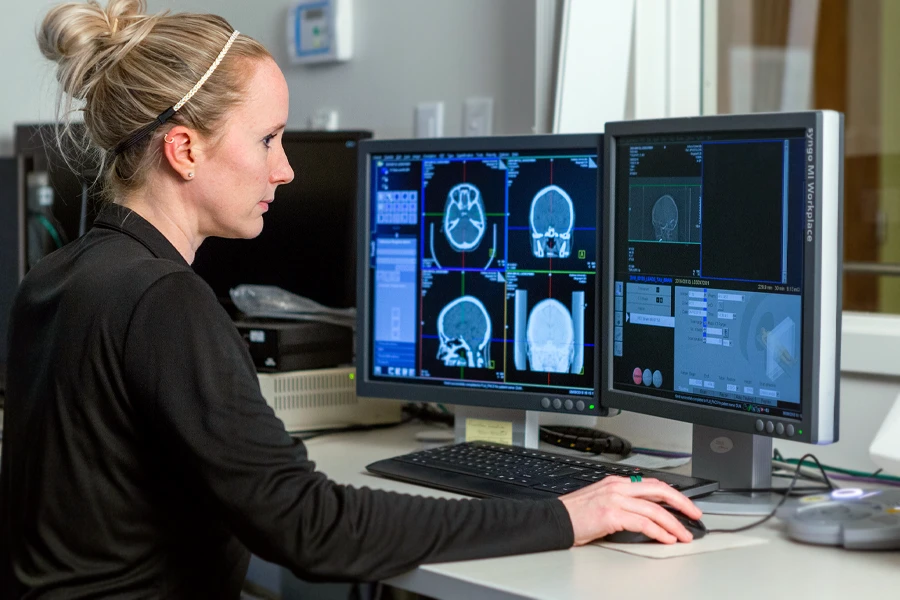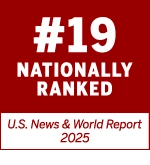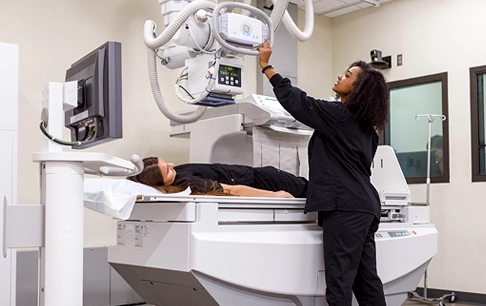Ready to Apply?
Apply Now
Course Delivery: 100% Online
Total Credits: 120
In-State Tuition Per Credit: $290.00
Out-of-State Tuition Per Credit: $390.00
Cost of attendance may vary by campus. View the total cost calculator
Degree Overview
Complement your technical certification with enhanced communication, critical thinking, and problem-solving skills. Prepare yourself to pursue opportunities in healthcare leadership roles, healthcare education, research, and graduate school.
The B.S. in Medical Imaging Technology is for working professionals who are already certified in a medical imaging related field. If you are not certified in one of these areas, you are not eligible to apply. To become certified, you must complete prescribed educational requirements at a two- or four-year college and pass a national professional certification exam. If you are not eligible for the B.S. in Medical Imaging Technology, we invite you to explore options such as our B.S. in Applied Health Science or B.S. in Health Sciences.
The program may be completed on a full- or part-time basis.
As a student in the B.S. in Medical Imaging Technology, you’ll benefit from a career-focused program ranked among the best in the nation by U.S. News & World Report. You’ll graduate with an Indiana University degree respected by employers worldwide—and you can work on yours anytime and anywhere. Plus, you’ll enjoy personalized support services throughout your academic journey.
And the benefits start long before graduation. More than half of IU Online students advance in their careers before they complete their degree.
To apply to this program:
- Complete application for admission.
- Submit official transcripts.
- Submit official high school transcript or equivalent (may be required of some applicants).
- Complete an essay (may be required of some applicants).
- International applicants may be asked for additional materials.
Application Dates
This program has rolling admissions. Application review will begin upon receipt of all required application materials.
This degree is available at IU Indianapolis, IU Kokomo, Northwest, and IU South Bend.
The B.S. in Medical Imaging Technology program seeks to:
- Develop your ability to function as an active member of the healthcare team.
- Advance your communication skills.
- Advance your critical-thinking and problem-solving skills.
- Ingrain professional and ethical behaviors.
- Foster independent thinking and lifelong learning.
Gain experience in the following core areas:
- Medical Imaging Technology Principles (3 credit hours)
- Learn the history of the medical imaging profession.
- Master basic imaging principles for a variety of imaging modalities.
- Medical Imaging Technology Procedures (3 credit hours)
- Compare and contrast the various modalities in terms of radiation sources, uses, and safety.
- Apply medical imaging concepts and principles to analyze new uses and procedures.
- Anatomy and Pathology (6 credit hours)
- Explain the different disease states that are seen or treated within the field of radiology.
- Determine which radiologic procedures are used in the diagnosis and treatment of various disease states.
- Analyze how physicians use patient data and images for use in patient case management.
- Identify anatomical structures of the human body.
- Describe relationships of structures to one another.
- Discuss the different appearance of anatomy from one modality to another.
- Research in Medical Imaging Technology (6 credit hours)
- Demonstrate computer skills needed to perform a literature search.
- Formulate a research question.
- Research a selected topic.
- Use a variety of multimedia tools to produce images for presentations and posters.
- Disseminate scientific information in a professional-quality poster and research paper.
- Investigate the basic tenets of human-subjects research.
- Medical Imaging Technology Nonclinical Concentration (12 credit hours)
Students with both a primary and post-primary certification (i.e., RT and CT) are eligible for up to 12 special credit hours. Special credit hours cannot be used toward the 30 in-residence IU hours.
You must complete 12 hours of elective coursework. You may develop your own tracks with the consent of your program faculty.
To graduate with the B.S. in Medical Imaging Technology, you must:
- Complete 120 semester credit hours, including:
- All campus general education requirements
- Program core course requirements
- Complete at least 30 credit hours through Indiana University.
- Complete at least 30 credit hours at the 300- and 400-level.
- Maintain a minimum GPA of 2.0, and achieve a minimum grade of C in each required course.
- Students who fail more than two classes will be dismissed and must petition for readmission.
Core Courses
You will be required to take one course from each of the following categories unless otherwise specified.
- Principles (3 credit hours)
- AHLT-R 405 Advanced Diagnostic Imaging I
- RADS-R 405 Advanced Diagnostic Imaging I
- RADI-R 451 Medical Imaging Theory I
- Procedures (3 credit hours)
- AHLT-R 406 Advanced Diagnostic Imaging II
- RADS-R 406 Advanced Diagnostic Imaging II
- RADI-R 453 Medical Imaging Theory II
- Anatomy and Pathology (6 credit hours)
Multiplanar Anatomy and Pathology I
- AHLT-R 472
- RADI-R 472
- RADS-R 472
AND
Multiplanar Anatomy and Pathology II
- AHLT-R 473
- RADI-R 473
- RADS-R 473
- Research (two options - 6 credit hours)
Option 1: Archival and Human Subject Research - Complete two courses.
- RADI-R 456 MIT Projects I
- RADI-R 457 MIT Projects II
OR
Option 2: Advanced Study and Applied Research in Medical Imaging - Complete R 407, R 403, or W 314.
- AHLT-R 407 Seminar in Medical Imaging
- HSC-W 314 Ethics and Health Professionals
- RADS-R 403 Advanced Topics in Medical Imaging Technology
AND complete R 409.
- AHLT-R 409 Project in Medical Imaging
- AHLT-R 409 Sr. Projects in MIT
- RADS-R 409 Sr. Projects in MIT
- Electives (12 credit hours)
TOTAL CREDIT HOURS 30
Find course descriptions with our Search Schedule of Classes/Courses tool.
Find the answers you need or start your application. We’re here to help!

